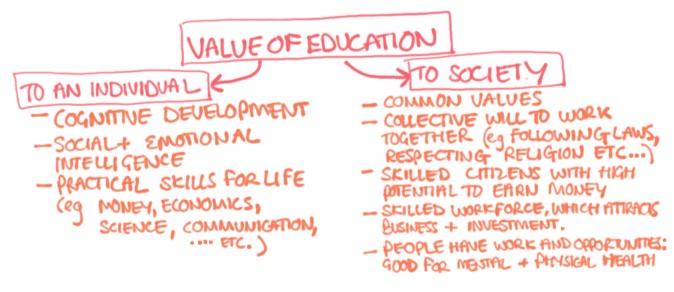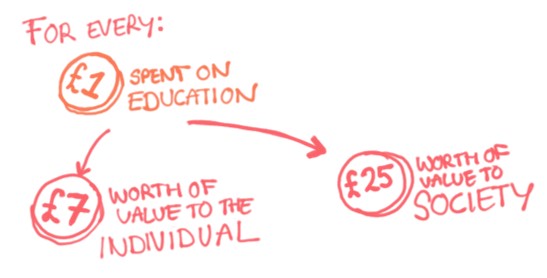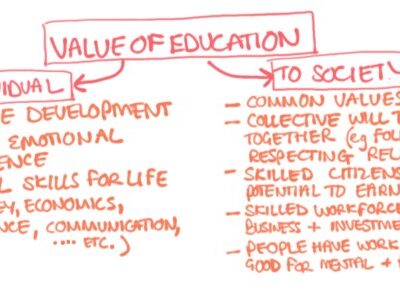Education is one of the most valuable things a person can have. Many people will know the saying; “Give a man a fish, feed him for a day. Teach a man to fish, feed him for a lifetime”. Intuitively, we understand that education is important- but how important.? In this post I explore: What is the value of education? What is the value in pounds? What is the value of education to social mobility? Do we invest well in our schools? and is funding schools education or charity?
What is the value of education?
Education provides value to individuals and to society. For an individual, the value of education is in cognitive development; social and emotional intelligence, practical skills for life like money/ economy/ science/ communication and interpretation.
(Actually schools can be pretty bad at delivering some practical life skills which is part of my reason for writing these posts but they do the job even it could be done better).
For a society, the value of education is in creating individuals that contribute as much as possible to the collective society and are as self sufficient as possible. This means preparing and training up the workforce of the future. It means instilling common values into the society to create a collective will to work together (e.g. abiding by laws, being respectful of religions). Education is about creating skilled individuals who have potential to earn high slaries and contribute through their taxes. It’s a skilled workforce that attracts businesses to set up in the country which creates jobs and boosts the economy. Education empowers people with skills so they find a job they enjoy which is good for mental health. It enables people to manage their physical health (eg quitting smoking) so they don’t drain the health services.

Equipping people with the interest to learn and opportunities to learn at any stage of life will mean that even if industries change and some jobs become redundant, the workforce are adaptable and will find new employment to keep contributing. They will not be stuck in their positions, living off welfare (at cost to the government) for long periods.
Does education affect social mobility?
Strong state education is such a powerful way to create social mobility. This means to give each child an equal starting point in life, no matter what family they come from, so that they each have the same opportunities. Early spending and intervention through a really high quality education for every child is so much more cost effective than what governmnet spend on welfare payments and unemployment benefits. Low incomes are unable to contribute through tax. Low income households can create additional costs to society as well such as costs to the public health system from avoidable factors like from improper diet, long manual shift hours, stress at money and job insecurity. Crime is often higher when there is desperation which can come about when money is tight and there are few prospects/employment or activities to engage youths.
What is the value of education in pounds?
We can calculate exactly what value every pound spent on education adds to the society. I have take these calculations from “what we owe to eachother” by Minouche Shafik in her chapter on education. They’re UK Government future of skills and life-long learning statistics.
In the UK for every £1 spent on education there is a £7 return to the individual. There is also a £25 social return to society from things like higher tax payment, lower welfare spending and fewer crimes.

These things will have a different value depending who they’re calculated by. Like with any statistic – you assess what to make of them as you go. To me though, wow these numbers are so helpful in creating some scale of the picture. Whether its £7 or £6 or £8 is irrelevant to me. It’s a good investment! If you’d like to think some things through for yourself- google the costs to society for drug crime or petty theft (police, court systems, law systems, prison systems….). Here is a resource at this web address, called the ‘social return on investment calculator’ that explains how these sorts of calculations work. OR just have a google- it’s very interesting.
Do we invest well in our schools?
This is a complicated question because ‘well’ needs to be defined. It would be nice to explore this against other countries and against what we’d like an an outcome from schools. But this section looks more at how flaky all commitments to school spending have been over the past few years. Its more of a taster for how we value education, rather than an absolute assessment of ‘do we give the exact right amount of money’.
The UK has private and public schooling. Public schooling with mixed income families is so important. It’s easy to see headlines in the media that say how much money is being given to schools, but none of us know what £2 billion into education actually means. The scales of these operations are so big we don’t have a sense from a simple number like that whether its good or bad. We also don’t know exactly where in the country it will go and how it will feed the school system.
School funding
For the last decade the Tories have systematically undercut funding for schools. These sorts of cuts are hard evidence of the lack of value given to education. Problems that come from schools now, are likely a result of all the money that’s been cut. So an offer of a packet of more money is hard to assess in terms of what value it might provide. This article written around the 2019 election (I use a slightly older date as it’s easier to see how things were before the pandemic) gives a better sense of the scale of new funding pledges against all the cuts that have been made over the past 10 years. It’s a two minute read. I’ve included two snippets below as an indicator.
“these school policies burst with many spending commitments that, the private memo admits in line after line, are merely “reprioritised programme spend” – Whitehall’s way of saying they’ll be paid for by cutting other parts of the teaching budget. (Aditya Chakrabortty, Guardian opinion, 2019)
Or this snippet here:
“The centrepiece is a one-off £2.8bn, which doesn’t reverse the cuts made over the course of this decade by the Conservatives. To do that, calculates the respected Institute for Fiscal Studies, Johnson will need to stump up £3.8bn every year.
And the majority of schools won’t see an extra penny, since the briefing makes clear that cash will be directed at “areas of the country that have been historically underfunded”, such as the south-west, Essex, Kent and the shires. The funny thing about those regions is that they just happen to be full of Conservative target seats.” (Aditya Chakrabortty, Guardian opinion, 2019)
Is funding education charity?
Quality public schools is not ‘charity to the poor’, it’s a fantastic investment in a thriving society. My statistic earlier that each pound invested creates £25 return to the wider society. That’s a 2500% return on investment. That’s blows investment of the same money into the stock market right out of proportion!
Thanks for the reading this post about the value of education in our society and to our lives. I am so pleased you are here on our page!
We are creating a community to engage in understanding the systems in our world and working towards a fairer, kinder, sustainable future. Join our monthly mailing list to become part of it and hear about what’s been published on the site and what is going on at Leg Up Understanding.
Thank you!

